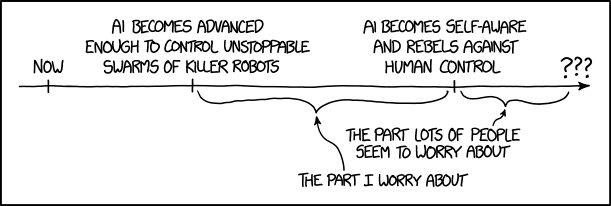

To be fair, a woman sleeping with anyone who is not her license-designated lover / owner is interpreted in Hollywood to be an act of rebellion.
Outside the US, in the industrialized world, IRL, it’s just normal.


To be fair, a woman sleeping with anyone who is not her license-designated lover / owner is interpreted in Hollywood to be an act of rebellion.
Outside the US, in the industrialized world, IRL, it’s just normal.


Roller skates!
If you tell the truth, I won’t get more angry.
Mostly because I’m at peak rage already.



Isn’t Musk asking for trillions to create a robot army?


This is the first time I noticed she cut into the plate…or didn’t cut into the plate, depending.
It was the silent p in pterodactyl that said everything, not her silence.
You’re stuck in your head again, over-analyzing sentence structure, aren’t you she expressed with a mere glance.
I’m not really even in this conversation. She added with a blink. No doubt about it.
Haute Couture was more about the Haute, and gender designation was a secondary concern at least until the 19th and 20th centuries in which boys and girls got color-coded and men and women weren’t allowed to look like each other.
New, modern fashion blends right in with the rise of preppy style and existing in sportswear rather than business attire, especially since New York didn’t have aristocrats…allegedly.
Before then, what was more important to an elite was they looked elite. Aristocracy is, after all government by the best where the best means having the most money.
Because the god Wotan would get mad.
And that’s a god you don’t want mad at you.


This is part of the paradigm that brought us the alt-right.


Related from my own defunct blog: Skulls in military symbolism are actually not particularly odd, as indicators of toughness and ferocity (and in Navy a nod to the Jolly Roger, which was partly an identifier of the pirate vessel, but also a call to surrender with the promise of quarter…)
Discussing the M&W Are We The Baddies skit and the preponderance of skulls in Waffen SS kitch.


Related: Why TF is ICE wearing camo if they’re law enforcement?
That’s why you size-up your fries order. 🍟
ETA: If you think your GF wants dessert and is eying the lava cake ad, decide you’re going to get dessert. If she persists in her resistance, order the lava cake and two spoons.
Sometimes you gotta force being human on people who’ve been mask-on for too long.


For most definitions of supernatural, no.
I believe in unidentified areal phenomena, not that it’s ETIs or aliens, but that something’s up there doing its thing.
I believe in ball lightning even though we don’t have a model of electrodynamics that explains it.
There’s some weird shit out there, Horatio, that isn’t explained in our philosophy. I’m sure we don’t have all the answers. I just am okay with knowing we don’t know what those answers are.
As for ghosts, spirits, afterlife, etc. There’s strong evidence those things do not exist, just in the stark silence where there should be noise.
I do pretend that treating my cat well and wearing cat themed tees and keeping cat kitch does please the cat gods. 🐱👤
We’ve been in an oligarchy for a while, according to an Oxford study of US history and the policy voting behaviors of elected representatives. It’s only gotten spicy since Reagan, when the Republican party decided it had enough power to take all the cake (and is trying to do so).
The Federalists tried this before, which caused the party to die out and the Democratic Republicans to split. (Source: Helen Cox Richardson) It’ll be exciting to see how this all plays out.


When I was just a lad looking for my true vocation
My father said "Now son, this choice deserves deliberation…
Though you could be a doctor…
…or perhaps a financier…
My boy, why not consider a more challenging career!"
Adolph Hitler: 39 known attempts
Charles de Gaulle: At least 31 attempts
Fidel Castro: Fabián Escalante, former chief of Cuba’s intelligence, stated that there had been 634 assassination schemes or attempts.
Josip Broz “Tito”: About 22 attempts
So, Fidel Castro by far… according to one source. That’s a mess and a half.
Hitler is 39 attempts known, according to Wikipedia’s list. There may have been unknown ones.
Can I get robbed by the movie guy, please?
I became too crazy for my wife.
I was pretty crazy when she took me in (also hella creative and hella horny), but the COVID-19 lockdown did a number on me everyone, including me, and then I couldn’t get back into therapy because it’s impacted.
TMI
On one hand, yeah, so much for in sickness and in health and on the other hand I know I can be batshit insane and fucking scary a bit of a burden sometimes.
Also I’m really, really big on consent and (only) what the girl wants, the girl gets. When she wants out, she gets out. (I’m jealous of the new beau, but more because I’m desperately lonely than a need to possess and contain her). Also she pushes herself to move on after loss (say when we lost our dog, we got a new puppy pretty quickly), where as I want to squeeze all the grief out for a year or two before unfurling my sails once again.
Being human is just hard.
Happy birthday,… Mr. President…